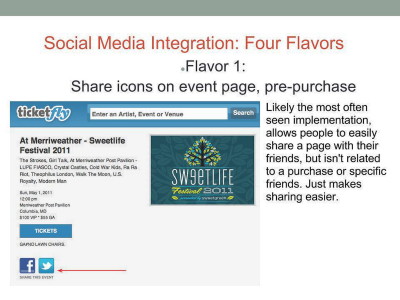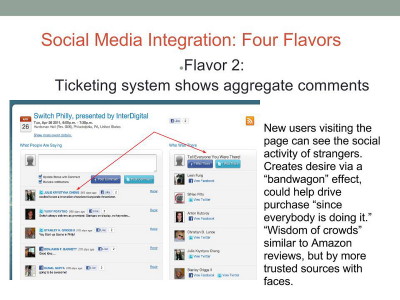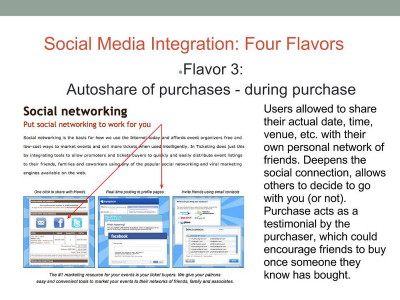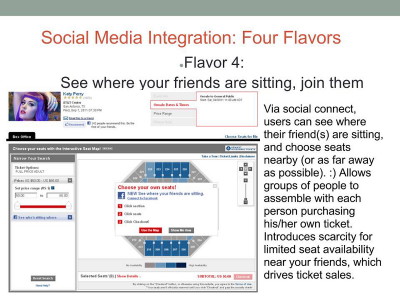Special Reports
Buying a Ticket Is a Social Event
 A consumer psychologist examines the impact of social media on ticketing.
A consumer psychologist examines the impact of social media on ticketing.
Remember when it seemed revolutionary to sell tickets online? Web sales are still a major improvement over the old days, reducing staff time in the box office, easily filtering choices for customers, and enabling a transaction at any time of day or night. Today, many organizations sell as many as 80 percent of all tickets online.
In the early phase of web sales, buying a ticket was a solitary experience: go online, choose the seats, put in the credit card, and receive an email confirmation. Patrons could not see what others were purchasing (other than to see what tickets were going fast as fewer seats became available). Today, people are used to sharing their activities with their friends on Facebook, Twitter, and other social media. Buying a ticket now has the potential for social-media interaction. New statistics prove the increasing impact of the trend:
- Consumers are 71% mre likely to make a purchase based on social media referrals
- 90% of people believe brand recommendations from friends
- 70% believe consumer opinions (from total strangers)
So social networks are an increasingly effective sales tool. But why?
Human beings are influenced by a complex web of social norms. Consider: the embarrassment of applauding at the end of a piece of music when nobody else is, the pressure to face in the same direction as everyone else on an elevator, the desire to not be the one who eats the last donut in the box (some people feel so uncomfortable with this, they will break the donut in half and leave a half behind). People seek to “conform,” and are more comfortable doing what they see others do, in life, and—in the 21st century—on social networks.
Imagine that “John” has just purchased a ticket to a new musical (let's call it South Atlantic). The ticketing system asks him “Would you like to share this purchase on Facebook?,” and John clicks on “yes.” In John's news feed, a new post goes live, telling his friends that “John has just purchased a ticket to Friday's performance of South Atlantic—would you like to join him at this performance?” Friends who click “yes” will be given the opportunity to buy a ticket to the performance John is attending, which in turn will generate a post to theirfriends, and so on. The built-in personal endorsement has vast marketing benefits, particularly as compared with generic audience marketing.
Several systems offer the ability to connect to social media, but there is still a great deal of experimentation, and nobody has discovered the perfect formula yet. Should the post to one's social networks be automatic? Should patrons receive an incentive to post their ticket purchase or if a friend purchases a ticket? Ticketing-system suppliers are dealing with these issues in a variety of ways; I have grouped them into four “flavors” of social-network ticketing.
Flavor 1: Pre-purchase share icons on the event page. Likely the most frequent implementation, this method allows people to easily share a ticketing purchase with their friends, via one-click social share buttons. The link to the run of the show is shared, but without relationship to a specific date, performance, or friends. This is the equivalent of just giving the friends the URL to the starting ticketing page for the show.

If this is your ticketing systems' method: Tell your patrons that they can share the main ticketing purchase page that lists the full run of the show with their friends, and share it yourself via your own social channels.
Flavor 2: Ticketing system shows aggregate comments. Users visiting the ticketing page can see the activity of all purchasers; they may be strangers, but the effect is the social-norm “bandwagon,” driving purchases “since everybody is doing it.” This “wisdom of the crowd” approach is similar to Amazon reviews.
If this is your ticketing systems' method: Message your patrons to visit the page and see all the people who have recently purchased tickets. This can also create the impression of a scarcity and influence people to buy now, before they are all gone.

Flavor 3: Auto-share of purchases, during the purchase. Users are asked to share the actual date, time, and venue of a specific performance with their own personal network of friends. This deepens the social connection, acting as a personal testimonial by the purchaser.
If this is your ticketing systems' method: Ask customers to share their specific purchase information with their friends. Provided that your system can track additional sales from a social share, consider creating a small incentive—a free cookie at intermission can do wonders.

Flavor 4: Share purchases and sit with your friends. The most advanced method, this allows users to actually see a picture of each of their friends who have purchased a ticket, and where they are sitting; this way they can sit with their friends, or join a group attending.
If this is your ticketing systems' method: Advertise it as a side benefit to the ticket purchase; people want to sit with their friends. And for people who are “on the fence,” it further encourages a sale.

To cap the full potential of social sharing, savvy marketing and box-office staff should keep three things in mind:
1. Research the capabilities that your current ticketing system offers. If you are not sure, call and ask. Let your provider know that you are interested in these features; ask for best practices of other organizations that use their system.
2. Pay attention to the social sharing capabilities of other systems when you purchase tickets for yourself. People who work in arts organizations attend a lot of performances. Encourage staff to be aware of what other ticketing systems allow them to do socially.
3. Ask your ticketing supplier about new functionalities. If you see features in another system that you want in your own, ask your supplier if they will be coming soon. If not, why not? What will they be providing that is a better solution?
Sharing ticket purchases is a powerful sales tool. Best practices have not yet been set, but you should know your system’s capabilities, and keep an eye out for new methods as they evolve. The “virtual testimonial” has incredible value, and should be cultivated and encouraged wherever possible.
* Source: Nielsen Advertising Global Report, July 2009; Channel Advisor report on Facebook ecommerce, June 2011; The Guardian, August 2010

Ron Evans is a consumer psychologist, and principal consultant at Groupofminds.com Arts Marketing Consultants in Sunnyvale, CA. He helps arts organizations increase their understanding, appreciation, and frequency of attendance through innovative uses of technology.

WHO'S BLOGGING

Law and Disorder by GG Arts Law
Career Advice by Legendary Manager Edna Landau
An American in Paris by Frank Cadenhead





 FEATURED JOBS
FEATURED JOBS

 RENT A PHOTO
RENT A PHOTO


